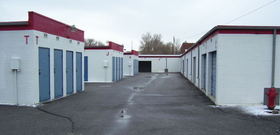Is Your Storage Unit Secure?
Keeping track of what you have where and how its secured are often challenges that many business owners feel overwhelmed with. Most business owners will even say that there is a certain amount of risk that comes with storing material, items, or stock outside of the confines of their area of operation. The biggest question is whether to store offsite or onsite.

Below, we'll discuss the pros, cons and tips to help you make that choice for yourself.
Onsite Storage
An onside storage solution usually involves leasing a storage container. These containers are exactly the same as the containers used for freight ships and are often brought to your site using a diesel truck.
Pros:
Cost wise, these containers are not any less expensive than a traditional storage facility. What they do is offer the owner the ability to have close access to whatever is being stored in these units. This means no driving to a facility or need to maintain a truck or other vehicle for transport.
This also means that the owner does not have to leave their business or risk an incident by sending an employee to an off-site storage unit in a company vehicle or their privately owned one.
Cons
These units do not come with a 24 hour security officer, so you're on the hook for what happens after hours. While these units require a padlock, this is not always the most secure solution.
Also, the doors of most units can be a little tricky to close; verify you have closed the door and it is secure before closing the padlock. Most theft comes from employees believing they have closed and locked the doors, when in fact they are merely pulled to.
Leasing contracts might or might not include the provision that if the unit is vandalized or otherwise damaged that the business owner is responsible for the cost of clean-up, repair, or replacement. Read your contract well, and ask about insurance, if any is available. Sometimes, your business' insurance will cover a temporary storage unit on site as well.
Tip: Placement of your temporary storage unit can be critical. At times, these units can block cameras or windows that need to be free of obstruction. Make sure you have enough room to put a unit into place.
Offsite Storage
Offsite storage units can be leased warehouses, warehouse companies, or traditional storage units. While these units specialize in keeping other people's belongings for them, this does not necessarily mean this is the best option for all.
Pros
Often these units are temperature controlled. This means that your items will not be effected by weather conditions. Also, these units generally will have good lighting on the inside. If you might be accessing your belongings during night hours, this is much better than rummaging around in the dark with only a flashlight.
Security is provided. Nearly every storage unit or warehouse has a security solution in place. Access is almost always restricted and often a good service will have a security officer on premise as well to help control access and keep track of the overall integrity of the site.
Cons
If you are needing instant access to whatever you have in storage, you will lose whatever time you have to drive to and from the storage unit. What's more of a hassle is the idea of inventory. If you are required to reconcile items in the unit it will either be you alone, or require taking an employee away from another task to help inventory. If the storage unit is a half hour away, you will lose one man-hour per individual for trips and inventorying.
Tip
While security values vary by storage company, convenience is often the deciding factor. For items that you will not use or need access to at a moment's notice, a storage facility can very well be the answer. Make sure the facility offers an insurance solution. Most business insurance will not cover offsite storage.
While both solutions have their pros and cons, one additional factor to consider is what you will be storing in these units. Temperature control might be a nonfactor, or it might be everything depending on what you will be store and the mean temperature of your location.
In the end, your choice could very well be based on convenience alone, however. Deciding if you will need into the unit on a regular basis and what that basis is the best place to start when making your choice. Speaking with different sellers will help you decide which choice is best for you.
Ready to Compare Monitored Alarm Systems - INACTIVE Price Quotes?